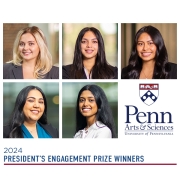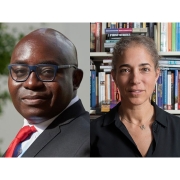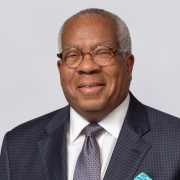Arjun Yodh Named Director of the Laboratory for Research on the Structure of Matter
Dr. Arjun G. Yodh, a researcher studying condensed matter physics, medical and biophysics and optics has been named director of the Laboratory for Research on the Structure of Matter (LRSM) at the University of Pennsylvania.
Dr. Yodh has pioneered the use of diffuse optics as a tool for medical diagnostics, including imaging of breast tumors and functional imaging and spectroscopy of the brain, and he has employed optical techniques such as laser tweezers and confocal microscopy for the study of interactions and phase behavior of soft-matter systems.
The James M. Skinner Professor of Science, Dr. Yodh’s primary appointment is in the department of physics and astronomy in the School of Arts and Sciences at Penn. He holds a secondary appointment in the department of radiation oncology in the School of Medicine and is a member of the LRSM, the Institute of Medicine and Engineering, the Bioengineering Graduate Group and the Abramson Cancer Center at Penn.
“The appointment of Arjun Yodh as director after an extensive and highly competitive search bodes well for the continued success of LRSM, one of Penn’s first and foremost cross-disciplinary institutes bridging the research endeavors of three schools and 11 different departments,” President Amy Gutmann said. “Arjun is truly representative of Penn’s unique and extraordinary cross-disciplinary faculty expertise. His demonstrated commitment to collaborating with colleagues from across Penn’s campus has yielded groundbreaking research advances in a number of traditionally disparate fields.”
Dr. Yodh has made fundamental contributions to the understanding of “soft-matter” materials like colloids, polymers, gels and liquid crystals. He is particularly known for his work on measuring and controlling entropic forces between both spherical and rod-like colloidal particles mediated by the presence of smaller colloidal or polymeric particles.
He succeeds Dr. Michael L. Klein, the Hepburn Professor of Physical Science in the department of chemistry in the School of Arts and Sciences (Almanac February 2, 1993).
“Penn is indeed fortunate to be able to call upon Arjun Yodh to assume the directorship of the LRSM as Mike Klein steps down after more than 16 years of outstanding service,” Interim Provost Vincent Price said. “Mike was instrumental in building the LRSM into a world-renowned institute for materials research, with substantial support from the National Science Foundation and other partners, and we look forward to working with Arjun to build upon Mike’s impressive accomplishments.”
Dr. Yodh becomes the 10th director of the LRSM, which was co-founded in 1960 by Penn investigators Dr. Robert Maddin, Dr. Robert Hughes, Dr. Norman Hixson and Dr. Eli Burstein as one of the nation’s first materials research laboratories. In 1996, the core of the materials research program at the LRSM was designated as a Materials Research Science and Engineering Center, or MRSEC, by the National Science Foundation. Through MRSEC, the LRSM is able to provide crucial support for Penn faculty, postdoctoral fellows and graduate students drawn from different disciplines to tackle complex materials science projects that can only be addressed in a collaborative mode.
The LRSM has produced landmark research discoveries, most notably the discovery of conducting polymers by Nobel Laureates in Chemistry Dr. Alan J. Heeger, Dr. Alan MacDiarmid, both Penn professors and Dr. Hideki Shirakawa, a visiting research scholar (Almanac October 17, 2000).
Today LRSM remains a leader in the synthesis, characterization, theory and modeling of entirely new classes of materials that are likely to underlie the development of future technologies that substantially impact the research and educational needs of society.
“In addition to facilitating collaborations between faculty from Penn’s different departments and schools, the LRSM is an engine for national and international community and economic development,” said Dr. Steven J. Fluharty, vice provost for research. “The LRSM is at the forefront of human resources development, designing and sustaining an array of novel educational programs benefiting K-12 students and their teachers, as well as undergraduates and faculty at minority-serving institutions across the globe. We look forward to Arjun Yodh extending the success of the LRSM’s outreach initiatives, particularly as he has been an important contributor to many of these programs.”
Dr. Yodh received his PhD in physics in 1986 from Harvard University and BSc in 1981 from Cornell University. Prior to joining the Penn faculty in 1988, he completed a two-year postdoctoral fellowship at AT&T Bell Laboratories. A Fellow of the American Physical Society and the Optical Society of America, Dr. Yodh has published more than 190 papers, and more than 20 students have obtained doctorates under his supervision.





